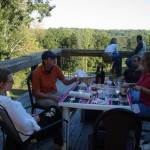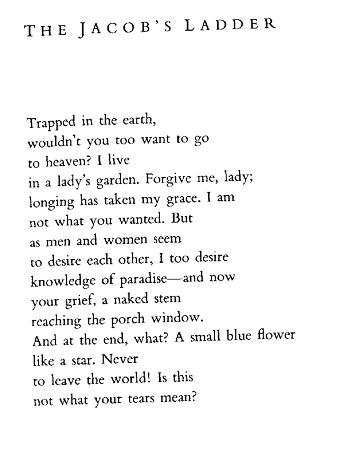Jan
1
2013
12 Months of Essays on Poetry and Craft: January 2013 Vol. 5 # 1
Learning to Write Poetry
Date 1/1/2013
There is a moment in every poet’s life when he realizes that poetry is no longer a passing flirtation, an occasional obsession, that it is not even something he continues to write with conscious motive—no longer just drafts in a journal, drafts to hang on the wall with thumbtacks, drafts to read to friends, drafts to turn into a workshop or drafts to submit to literary journals. The actual moment itself is perhaps scarcely memorable after it has passed, and even many years later the poet scratches his head wondering why exactly he continues to write poetry: “I don't know really—I just want to,” as a seasoned John Ashbery once said in an interview with Peter Stitt at the Paris Review.
 Writing poetry that goes beyond mere teenage angst and idle navel gazing is an enormous charge, one that requires patience, determination, and, no surprise, some version of learning (neither literature classroom nor poetry workshop being requisite)—and there are no guarantees. Keats, who died at twenty-five and was generally unsuccessful at building an audience for his work in his life, had no formal literary training; and yet, a line like “I see a lily on thy brow” didn’t spring forth from Zeus’ forehead either. It came through the unique, personal endeavor of reading closely the poets he loved and admired and using those poets to fashion his own distinct method of problem solving or style. Wordsworth’s work gave Keats a great bit of confidence and direction, and in turn Tennyson found his strength and strategy in Keats.
Writing poetry that goes beyond mere teenage angst and idle navel gazing is an enormous charge, one that requires patience, determination, and, no surprise, some version of learning (neither literature classroom nor poetry workshop being requisite)—and there are no guarantees. Keats, who died at twenty-five and was generally unsuccessful at building an audience for his work in his life, had no formal literary training; and yet, a line like “I see a lily on thy brow” didn’t spring forth from Zeus’ forehead either. It came through the unique, personal endeavor of reading closely the poets he loved and admired and using those poets to fashion his own distinct method of problem solving or style. Wordsworth’s work gave Keats a great bit of confidence and direction, and in turn Tennyson found his strength and strategy in Keats. Perhaps the only prerequisite to learning poetry is this: the poet has to love reading it first, so that he can find his own inarticulate answer to the great question “why write poetry?” after going page by page into the books and lines of his predecessors, contemporaries, and the long-dead bards of yore; thus, I suppose the impetus to write springs forth in defiance (not fealty, as one might suppose, as allegiance leads only to gratuitous admiration) of those poets whom have written memorable, admirable poems, and whom the young poet has come to love in some way. The inspiration to write, though? I suppose the inspiration springs from the soil of the earth itself.
Walking the earth, that is, seeing the world and making something of it—even if it’s just a backyard garden. I’m reminded of one of the “Matins” (or morning prayers) from Louise Glück’s book Wild Iris:
You want to know how I spend my time?
I walk the front lawn, pretending
to be weeding. You ought to know
I’m never weeding, on my knees, pulling
clumps of clover from the flower beds: in fact
I’m looking for courage, for some evidence
my life will change, though
it takes forever, checking
each clump for the symbolic
leaf, and soon the summer is ending, already
the leaves turning, always the sick trees
going first, the dying turning
brilliant yellow, while a few dark birds perform
their curfew of music. You want to see my hands?
As empty now as the first note.
Or was the point always
to continue without a sign?
I’m reminded, too of my good friend Timothy Shea, and his poem “Larkin Shaving” which appeared first in Poetry London a few years back:
Slowly, like a rain-soaked branch in wind,
he limps into the toilet and eyes himself in the mirror –
cheeks a white pear or swollen purse;
champagne’s electric kiss fresh on his lips.
He cracks the large-print bible’s tight binding,
and a fat smudge of crows, provided for
and unwanting, flips and settles outside on the lawn.
A splash of warm water and the pores open.
Half-pleasure, half-rite, he spreads the foam
as if mapping a route for God through a pass
in the jaw line, cutbacks over the Adam’s apple.
His stiff bristles soften like the church tasters
at St Stephen’s, sitting quiet in their pews.
He will make the rough smooth. He will bow his back
to rinse his face. He will put his mouth to water.
Neither poem is much longer than a sonnet, and each one seems to find its emotive power in the quietest harmonies of the everyday task: weeding and shaving—very similar acts, too, and both of them are full of such personal ritual. Whether I see Plath or Eliot or Bishop or Larkin lurking inside the tapestry of these poems is ultimately moot with regards to the success of each poem. What makes each one successful though (or at minimum shareable) is the confidence of the poet to clearly assert his and her own individual style: Glück’s and Shea’s syntactical choices, line breaks and the imaginative leaps of language feel so unique and authentic, because, in fact, they are unique and authentic.
❧
This may be a foolish digression, but if I am to discuss the art of learning poetry here, it would be impossible not to discuss learning in a workshop environment, which is the predominant experience of my contemporaries and it appears as though it will continue for the next generation as well.
Sadly, I don’t think much can be explicitly learned from lecture, save perhaps the abstract fundamentals of meter, line break and other basic tools of the craft. Nor can much be learned from the feedback of peers or professors, other than perhaps the poet’s own tendencies: strengths and weakness, that is. I remember catching hell in early workshops for striking high moments of diction in poems that otherwise strove for rhythms of natural, everyday speech. I also learned one hard and valuable lesson from workshops: poets, oftentimes, must cut the best lines of a poem for the sake of the poem. Seems counterintuitive, but I assure you it isn’t.
Perhaps the most important lesson the workshop teaches is distance between the poet and the poem—real, honest to goodness emotional distance. No bullshit middle ground here. The poet must learn to bring in a poem like it was a tender slice of his heart, to go stoic while it gets kicked around the table for awhile, and to disavow any relationship with the poem other than the name he has reluctantly attached to it. This distance is invaluable, because writing has an ugly cousin named publishing that, if the poet is lucky, will eventually come to call.
 A friend I correspond with fairly religiously told me that Louise Glück’s first book Firstborn (first editions selling for a modest $300 these days) was rejected twenty-eight times before it was finally accepted for publication; my own was rejected thirty-four times; and Timothy Shea is still shopping his first collection around (no doubt, “Larkin Shaving” will have its rightful place in there). What no one tells the young poet, although I wish they would, is how strong he must learn to be in the face of these high levels of impersonal rejection, and how steadfast he must be, believing in the rightness of his choices and in the immutable, timeless quality of his own poetry.
A friend I correspond with fairly religiously told me that Louise Glück’s first book Firstborn (first editions selling for a modest $300 these days) was rejected twenty-eight times before it was finally accepted for publication; my own was rejected thirty-four times; and Timothy Shea is still shopping his first collection around (no doubt, “Larkin Shaving” will have its rightful place in there). What no one tells the young poet, although I wish they would, is how strong he must learn to be in the face of these high levels of impersonal rejection, and how steadfast he must be, believing in the rightness of his choices and in the immutable, timeless quality of his own poetry.
Finally though, after all of that tiresome workshop critique and blather, and after all the publisher rejections have come and come and come again, the poet has learned to write better poems in the quiet hours he spends at his desk writing longhand or typing furiously against the keyboard. And when he has stopped attempting to please and delight anyone but himself and perhaps his internal coterie, the imagined audience (but first himself of course), then, and only then, will he have learned to write poems with enough confidence and swagger and failure hewn into every fragile, indestructible line to allow those poems to stand on their own two legs and take on all comers.
